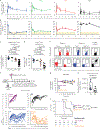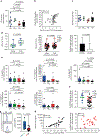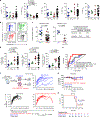Determinants of response and resistance to CD19 chimeric antigen receptor (CAR) T cell therapy of chronic lymphocytic leukemia
- PMID: 29713085
- PMCID: PMC6117613
- DOI: 10.1038/s41591-018-0010-1
Determinants of response and resistance to CD19 chimeric antigen receptor (CAR) T cell therapy of chronic lymphocytic leukemia
Erratum in
-
Author Correction: Determinants of response and resistance to CD19 chimeric antigen receptor (CAR) T cell therapy of chronic lymphocytic leukemia.Nat Med. 2021 Mar;27(3):561. doi: 10.1038/s41591-021-01248-2. Nat Med. 2021. PMID: 33547459 No abstract available.
Abstract
Tolerance to self-antigens prevents the elimination of cancer by the immune system1,2. We used synthetic chimeric antigen receptors (CARs) to overcome immunological tolerance and mediate tumor rejection in patients with chronic lymphocytic leukemia (CLL). Remission was induced in a subset of subjects, but most did not respond. Comprehensive assessment of patient-derived CAR T cells to identify mechanisms of therapeutic success and failure has not been explored. We performed genomic, phenotypic and functional evaluations to identify determinants of response. Transcriptomic profiling revealed that CAR T cells from complete-responding patients with CLL were enriched in memory-related genes, including IL-6/STAT3 signatures, whereas T cells from nonresponders upregulated programs involved in effector differentiation, glycolysis, exhaustion and apoptosis. Sustained remission was associated with an elevated frequency of CD27+CD45RO-CD8+ T cells before CAR T cell generation, and these lymphocytes possessed memory-like characteristics. Highly functional CAR T cells from patients produced STAT3-related cytokines, and serum IL-6 correlated with CAR T cell expansion. IL-6/STAT3 blockade diminished CAR T cell proliferation. Furthermore, a mechanistically relevant population of CD27+PD-1-CD8+ CAR T cells expressing high levels of the IL-6 receptor predicts therapeutic response and is responsible for tumor control. These findings uncover new features of CAR T cell biology and underscore the potential of using pretreatment biomarkers of response to advance immunotherapies.
Conflict of interest statement
Competing interests
J.A.F., S.F.L., F.B., R.M.Y., B.L.L., J.L.B., D.L.P., C.H.J. and J.J.M. hold patents related to CTL019 cell therapy. These authors declare no additional interests. The remaining authors declare no competing interests.
Figures




Comment in
-
Only the best CAR T cells.Nat Rev Clin Oncol. 2018 Jul;15(7):402-403. doi: 10.1038/s41571-018-0039-6. Nat Rev Clin Oncol. 2018. PMID: 29760506 No abstract available.
-
Explaining Resistance to CAR T Cells.Cancer Discov. 2018 Jul;8(7):784-785. doi: 10.1158/2159-8290.CD-NB2018-065. Epub 2018 May 16. Cancer Discov. 2018. PMID: 29769184
-
Insights into Chimeric Antigen Receptor Therapy for Chronic Lymphoblastic Leukemia.Trends Mol Med. 2018 Sep;24(9):729-731. doi: 10.1016/j.molmed.2018.06.007. Epub 2018 Jul 4. Trends Mol Med. 2018. PMID: 30149852
References
-
- Vesely MD, Kershaw MH, Schreiber RD & Smyth MJ Natural innate and adaptive immunity to cancer. Annu. Rev. Immunol 29, 235–271 (2011). - PubMed
Publication types
MeSH terms
Substances
Grants and funding
LinkOut - more resources
Full Text Sources
Other Literature Sources
Medical
Molecular Biology Databases
Research Materials
Miscellaneous

